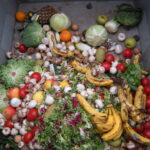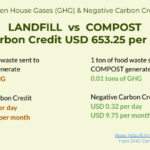Transforming Food Waste into Fertilizer: The Art of Composting
Composting Food Waste
 Composting is a sustainable and eco-friendly way to manage food waste, turning kitchen scraps into nutrient-rich fertilizer for your garden.
Composting is a sustainable and eco-friendly way to manage food waste, turning kitchen scraps into nutrient-rich fertilizer for your garden.
By diverting organic waste from landfills, composting not only reduces methane emissions but also creates a valuable resource for enriching soil. In this article, we will explore the process of composting food waste and the benefits it brings to both the environment and gardeners.
The Basics of Composting Food Waste
1. Selecting a Compost Bin: Choose a suitable compost bin based on your available space and needs. Bins range from small countertop models for apartment dwellers to larger outdoor bins for those with more space.
2. What to Compost: Include kitchen scraps such as fruit and vegetable peels, coffee grounds, eggshells, and non-greasy food leftovers. Avoid adding meat, dairy, and oily items as they can attract pests and slow down the composting process.
3. Balancing Carbon and Nitrogen: Successful composting requires a balance of carbon-rich (browns) and nitrogen-rich (greens) materials. Browns include items like dry leaves, straw, and shredded newspaper, while greens consist of kitchen scraps. This balance ensures optimal microbial activity for decomposition.
The Composting Process
1. Layering: Begin by layering browns and greens in your compost bin. A good rule of thumb is to alternate layers, starting and ending with browns. This helps maintain the right carbon-to-nitrogen ratio.
2. Turning the Pile: Regularly turn the compost with a pitchfork or compost aerator to introduce oxygen and speed up the decomposition process. Turning also prevents the formation of unpleasant odors.
3. Maintaining Moisture: Keep the compost pile moist, akin to a wrung-out sponge. Watering occasionally ensures that the microorganisms responsible for breaking down materials remain active.
Benefits of Composting Food Waste
1. Reducing Landfill Waste: Diverting food waste from landfills decreases the production of methane, a potent greenhouse gas. Composting is a simple yet effective way to combat climate change.
2. Creating Nutrient-Rich Soil: The end product of composting is a dark, crumbly substance known as humus. This nutrient-rich material enhances soil structure, fertility, and water retention.
3. Cost-Effective Gardening: Composting reduces the need for store-bought fertilizers, saving gardeners money while providing a sustainable alternative for soil enrichment.
Conclusion
Composting food waste is a powerful, accessible practice that empowers individuals to contribute positively to the environment. By transforming kitchen scraps into valuable fertilizer, we not only reduce our ecological footprint but also nurture healthier, more vibrant gardens. Embracing composting is a small yet impactful step toward a more sustainable and greener future.




